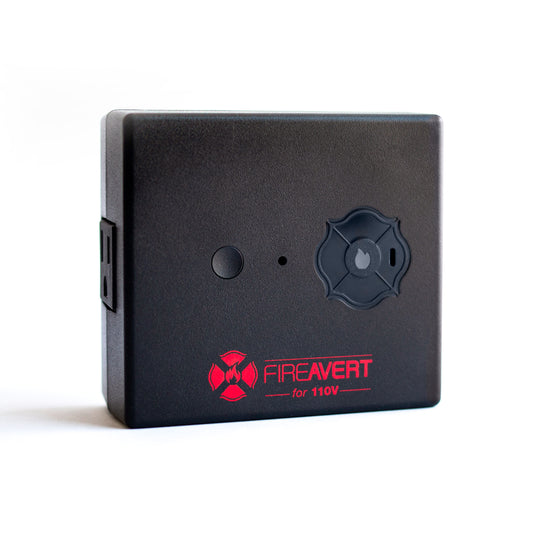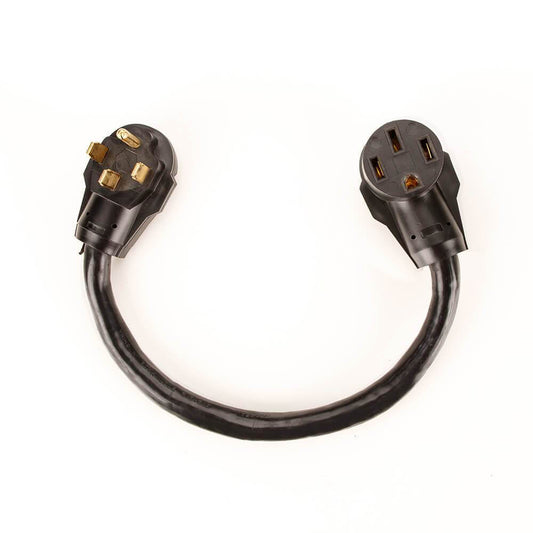Smoke Detector Chirping? Homeowner’s Smoke Alarm Guide

A smoke detector, also known as a smoke alarm, is a life saving device. Whether your smoke alarm is chirping or you're looking for the best smoke detector, this guide covers everything you need to know. Jump to the section that matters most to you:
Quick Navigation
- Why is my smoke alarm chirping?
- Types of smoke detectors
- Smoke alarm placement rules
- Complete fire safety system
Why Is My Smoke Alarm Chirping?
To understand why your alarm is sounding, we have to determine how often your smoke detector is chirping?
- Is it beeping once every couple of minutes?
- Is it beeping 3 times followed by a short pause [repeated]?
- Is it beeping 4 times followed by a short pause [repeated]?
It beeps once every couple minutes
This usually means your smoke detector has a low battery. Even if your smoke alarms are hardwired they still have batteries.
How to fix it:
- Find the smoke alarm that is beeping and put a new battery in it.
- If they are all going off you can find the smoke alarm that first tripped by looking for the alarm that is flashing RED.
- Remove the detector and replace the batteries.
If this doesn't stop the beeping/chirping, replace the batteries in all of your alarms. If after all of this the smoke detector is still chirping, replace that detector.
Smoke alarms can go bad in as little as 3-5 years, so replacing regularly will ensure your home is protected.
It beeps 3 times followed by a short pause [repeating]
This alert means there could be smoke in the house. This could be a false alarm but treat this alert as if an emergency is happening.
What to do:
- Begin checking your home for smoke. If you see or smell smoke get everyone out of the house and call 911!
- If you can't find any smoke at first, check your cooking appliances as forgotten cooking can begin smoking quickly.
- Check bedrooms, storage rooms, and any other rooms.
- If there isn't any smoke in your home, remove the triggered smoke alarm- it will be flashing RED. Clean the alarm and take it outside to fresh air then replace it.
If there is no smoke in your home and the alarm keeps sounding, try replacing the batteries or replacing the alarm itself.
It beeps 4 times followed by a short pause [repeating]
This means there could be Carbon Monoxide (CO) in the house. There is no way for you to determine if this is the case, so treat this as an emergency every time.
What to do:
- Get everyone outside IMMEDIATELY and call 911!
- The fire department will conduct tests to detect any CO in your home.
- Follow instructions given by firefighters
Carbon Monoxide is a dangerous, and potentially deadly gas. It is odorless and colorless, which is exactly why every CO alarm alert should be treated as an emergency.
Many appliances can produce CO including: Gas stoves, gas dryers, water heaters, and more. If you want to learn more about CO read our complete guide here.
Remember... NEVER remove a smoke alarm because it’s beeping. Smoke alarms save lives and could save yours.
Types of Smoke Detectors
When you ask the question 'What is the best fire alarm?' there are two things to consider.
Wired vs. Battery Smoke Detectors
or
Ionization vs. Photoelectric vs. Dual Sensor Detectors
Let's start by understanding how smoke detectors work.
How do different smoke detectors work?
At the most basic level, a smoke detector or smoke alarm monitors an area for smoke and sounds an alarm if smoke is present. The way the smoke is discovered varies by type of detector.
Ionization Detectors:
These devices contains a small chamber, called the ionization chamber. Inside, there is a small amount of safe radioactive material which emits particles into the chamber. When smoke enters the chamber it interrupts the flow of ions, triggering the alarm.
These smoke alarms are very sensitive which can detect even small amounts of smoke. Due to the sensitivity, false alarms are more common among ionization detectors.
Photoelectric Detectors:
These devices use a light and a sensor to detect smoke particles. When smoke enters the device, it scatters the light, triggering the alarm.
This type of smoke detector is less prone to false alarms and are better at detecting larger particles. But, this also means it can't detect smoke as sensitively.
Dual Sensor Detectors:
The name 'Dual Sensor' can mean two things. Some dual sensor detectors use both ionization and photoelectric for double the security. Others refer to the ability to detect both smoke and Carbon Monoxide.
Dual Sensor smoke detectors are probably the safest, most effective alarm you can implement in your home.
Comparison Table
| Type | How It Works | Best For | Limitations |
|---|---|---|---|
| Ionization | Uses radioactive particles to detect smoke interruption | Fast-flaming fires (paper, grease) | Prone to false alarms from steam |
| Photoelectric | Light sensor detects smoke particle scattering | Smoldering fires (cigarettes, wiring) | Slower response to quick flames |
| Dual Sensor | Combines both technologies / adds CO detection | Complete home protection | Higher cost ($40-$100) |
Now let's dive into the benefits of a wired smoke alarm vs. a battery smoke alarm
Is It Better to Have A Wired or Battery Smoke Detector?
There are definitely pros and cons of both types of smoke detector.
Wired Detectors
Pros:
- Interconnection - Hardwired detectors are connected to each other on a system. This means if one sounds, all of them sound
- Reliability - Having a direct connection to a power supply improves performance
- Backup Battery - When the power goes out these detectors still work using a backup battery
Cons:
- Installation - These detectors need to be installed to wiring which is complex and should be done by an electrician
- Cost - The nature of these detectors makes them more expensive
Battery Detectors
Pros:
-
Affordable - These types of smoke alarms are typically cheaper
- Easy Install - This makes wireless detectors perfect for renters
-
Maintenance - The only maintenance required for these alarms is to replace the batteries
Cons:
- False Alarms - Due to the weaker connection, wireless smoke detectors are more prone to false alarms
- Connectivity - Because they are not wired together, these alarms aren't always able to be interconnected

Which type of Smoke Detector should I have in my home?
With all these complex differences and detection types, it can be hard to know which smoke alarm you should buy.
If you are a homeowner we recommend installing hardwired smoke alarms in your home.
If you are a renter, we recommend installing a battery powered dual sensor alarm in your apartment.
Where to Place Your Smoke Detectors
Now that you know which detector you want, you need to install them in your home/apartment. Here are three rules for placing detectors in your home.
3 Smoke Detector Placement Rules:
1. Have a smoke alarm in every bedroom and one outside sleeping areas. Large homes may require more detectors for larger spaces.
2. Smoke detectors should always be on the ceiling or high on the wall.
3. Kitchen alarms should be at least 10-15 feet from the stove.
Smoke detectors are critical in saving lives during an emergency. In fact, about 3 out of 5 fire deaths occur in homes without functioning smoke alarms. Placing smoke alarms in the right locations could save your life or the life of a loved one.
Building a Complete Home Fire Safety System
Smoke alarms are a critical piece in improving fire safety, but they aren't the only piece. Combining prevention methods, safety equipment, and education can make your home fire safe.
Home Fire Prevention
Most home fires start in the kitchen, so make sure your kitchen is fire safe. Never walk away from food while cooking, and if you absolutely must, turn off the heat. Keep flammable items like oven mitts, or wooden utensils away from burners.
For the rest of your home replace any damaged electrical cords. Never run cords under rugs or furniture and use surge protectors. Electrical fires are dangerous and deadly.
If you smoke, smoke outside and use deep, sturdy ashtrays. Never smoke in bed or when drowsy.
Store gasoline, paint thinners, or any other flammable liquids in approved containers and outside if possible. Keep them in cool, ventilated spaces away from heat sources.
Best Fire Safety Equipment
The best fire safety equipment/devices you should have are:
- Smoke Alarms - Everything we have talked about in this blog tells you why
- FireAvert Auto Stove Shutoff Devices - These automatically shutoff stoves when smoke alarms trigger, preventing fires and even smoke damage
- Fire extinguishers - For putting out any small fires
- Fire blankets - Smothers fires easily without the mess of extinguishers
Pairing these safety supplies together leads to a safer home. Installing an auto stove shutoff into your stove can prevent the #1 cause of home fires, unattended cooking. By using this smoke alarm monitoring device you can save yourself thousands of dollars.
If you are interested how a device like this works, you can read more here.

Home Safety Tips
Keep all of your systems working with a few simple habits. These include:
- Test smoke alarms monthly and replace batteries yearly (if applicable)
- Install Carbon Monoxide Detectors if your smoke detectors don't detect it
- Replace all smoke alarms every 10 years, or more often according to manufacturer
- Teach your children fire safety and practice family fire drills as often as you feel necessary
Combining home safety education, with top of the line fire prevention or safety equipment is an important prevention measure. Make sure your home is well protected from fires with these tips and life saving devices.
If you are looking for new smoke detectors, carbon monoxide detectors, or an automatic stove shutoff device shop here.




